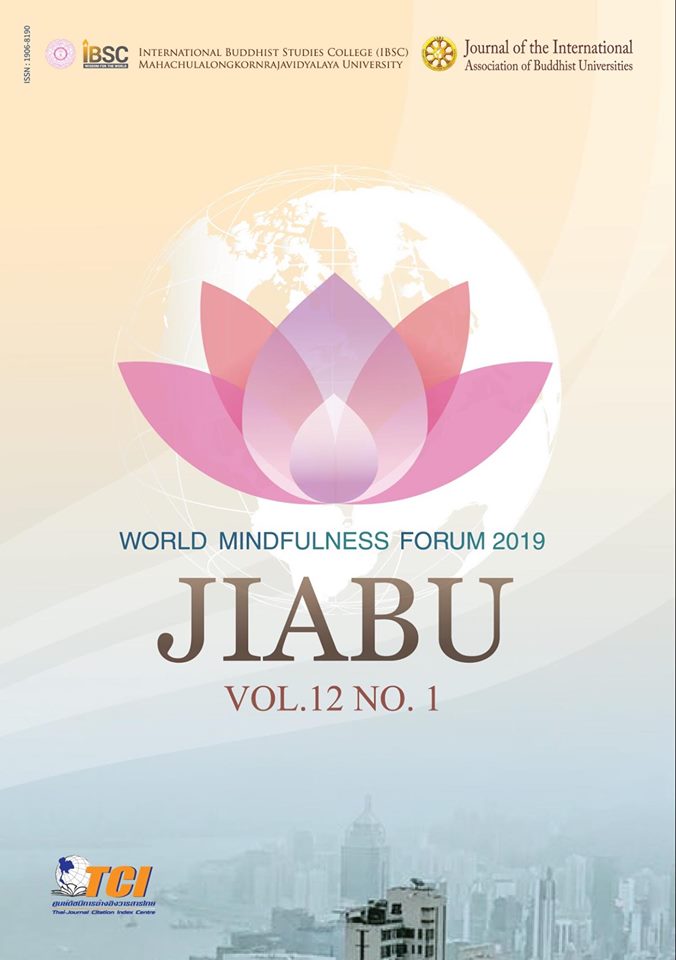Gestalt Interpretation of Ego and Dependent Origination
Main Article Content
Abstract
Buddhist translators and teachers commonly use the term ‘ego’ to depict and
elucidate Buddhist concepts. But when we examine how they use the term it is found to
be poorly defined and of many divergent meanings. In the psychological sense, according
to the standard Freudian interpretation, ego has a very clear, specific meaning, which is
very different to the way people commonly understand. At the same time as Freud was
popularizing his theories, another school of psychology called Gestalt also had an alternative
ego theory. In this paper will be analyzed the meaning of ‘ego’ as Freud intended it, how
it is commonly interpreted by non-psychologists, and how the Gestalt school understood it.
Each definition will be compared to Buddhism to find the common and divergent points.
Finally will be shown how the Gestalt interpretation fits with dependent origination.
Article Details
Views and opinions expressed in the articles published by The Journal of the International Association of Buddhist Universities (JIABU), are of responsibility by such authors but not the editors and do not necessarily reflect those of the editors.
References
Group.
Bodhi, Bhikkhu (1995), The Middle Length Discourses of the Buddha. Kandy: Buddhist
Publication Society
Cittasaṃvaro, Pandit (2019), The Integration of Dependent Origination and Gestalt Perception.
Bangkok: MCU
Dhammika, Shravasti (2006), The Buddha and His Disciples. Sri Lanka: Buddhist Publication
Society.
Erikson, Erik H. (1987), Childhood and Society. London: Paladin Grafton Books.
Freud, Anna (1968). The Ego and the Mechanisms of Defence. London: Hogarth Press and
Institute of Psycho-Analysis. (Original paper 1937).
Hall, Calvin S. (1954), A Primer of Freudian Psychology, New York: The World Publishing
Company.
Hartmann, Heinz (1964), Essays in Ego Psychology. New York: International Universities Press.
Koffka, K. (1936), Principles of Gestalt Psychology. London: Harcourt, brace and Company.
Köhler, Wolfgang (1947), Gestalt Psychology, An Introduction to New Concepts in Modern
Psychology. New York: Liveright.
Kohut, Heinz (1971), The Analysis of the Self. Chicago: The University of Chicago Press.
Liebert, Robert M. & Spiegler, Michael D. (1990), Personality: Strategies and Issues.
California: Brooks/Cole Publishing Company.
McAdams Dan P. &, Josselson, Ruthellen, & Lieblich, Amia, Identity and Story: Creating Self
in Narrative. Washington DC: American Psychological Association.
Nārada (tr.) (1979), A Manual of Abhidhamma – Abhidhammattha Sangaha. Kuala Lumpur:
Buddhist Missionary Society.
Payutto, P. A. (2002), Dictionary of Buddhism, Thailand: Wat Nyanavesakavan.
Pind, Jörgen L. (2004),Edgar Rubin and Psychology in Denmark. London: Springer.
Sumedho, Ajahn (1991), The Way It Is. Hemel Hempstead: Amaravati Publications.
Walshe, Maurice (1995), The Long Discourses of the Buddha. Boston: Wisdom Publications
Wertheimer, Max (1923), ed. w. Ellis, A Sourcebook of Gestalt Psychology. London: Routledge.
Wertheimer, Max (2012), Ed. Lothar Spillmann, On Perceived Motion and Figural
Organization. London & Cambridge MA: The MIT Press.
Woodward, F. L. (1993), The Book of the Kindred Sayings, vol. III. Oxford: Pali Text Society.

